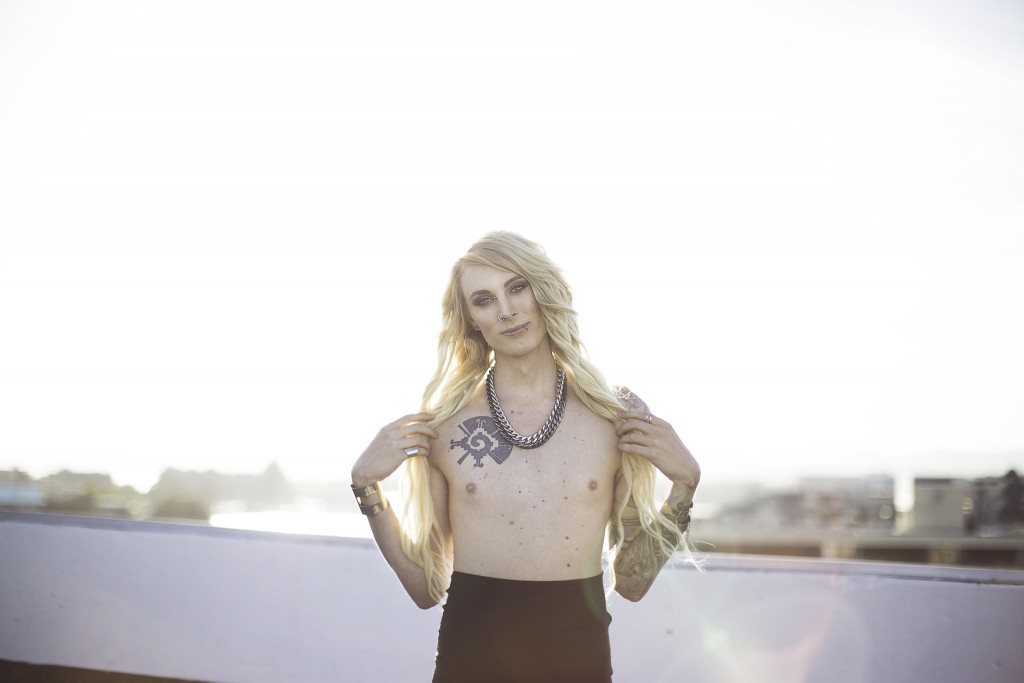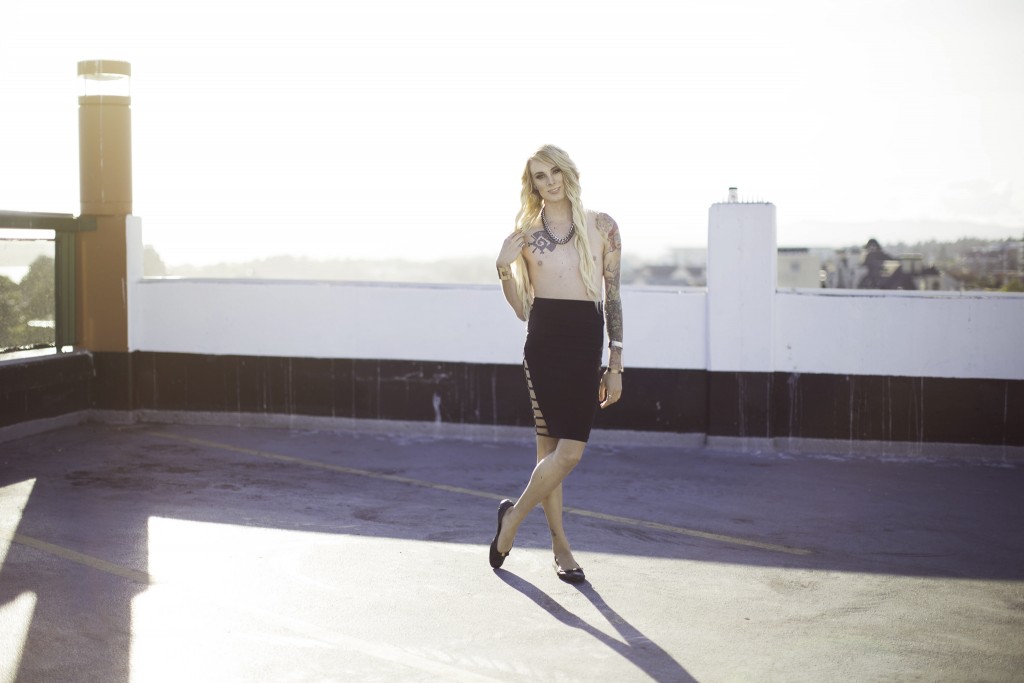Dear Facebook and Instagram, I’m a trans woman starting hormones. Are you going to censor me?
I’m going to make this awkward for both of us: A few weeks ago, my nipples started to ache. They told me it would hurt, but that didn’t prepare me for the constant dull throbbing and occasional burning sensation I feel when my shirt rubs across my chest the wrong way.
I’m going to sound like a masochist, but every little pain is followed by a slight smile. “I’m actually doing it,” I think. “This is actually happening.”
As a trans woman on hormone replacement therapy (HRT), I’m starting to grow breasts. Despite the pain it causes, it is exciting. I’m going to have boobs! All the changes HRT is having on my body are confirming my identity in ways I never thought possible. I’m starting to feel comfortable in my body in ways I’ve only prayed for and dreamed about.
My excitement often bleeds into confusion. Shortly after coming out as a woman and before I had started HRT, I was sunbathing topless in my yard when a roommate asked, “Since you’re a girl now, does that mean I’m not allowed to look at you shirtless anymore?” Though he said it jokingly, that thought stuck with me. The next day I went swimming and left a top on, because as a woman I feel ashamed when my nipples are showing, regardless whether the world sees them as a problem.
When people start to consistently see me as a woman, my privilege to be comfortably topless in public will be gone for good.
We can challenge that.
People treat you much differently when they see you as a trans woman instead of as a cis man. I already have a long list of privileges lost in transition.
Don’t get me wrong, I am remarkably privileged for a trans person: I live in the liberal city of Victoria, BC, Canada; my friends and family have been exceptionally accepting; I have access to resources that make the various expenses of transitioning financially viable (HRT alone can cost up to $150 per month); and my appearance and age (24) mean that I’m already starting to pass as cisgender. On top of that, I’m white, able-bodied and have had access to education. All those privileges will remain intact. Since coming out as a woman, though, I’ve slowly watched my cisgender male privilege evaporate.
While having drinks one night, a guy friend told me, “If you really want to be a girl, you should really have a purse. Oh, and your armpit hair is getting a little long.” Before coming out, no one told me how I should look. Hello, image policing.
After changing my OKCupid profile picture to a particularly flattering photo, I came home to a few messages. “Can I lick your feet?” said one. “I’d hit it, probably,” said another. One guy actually sent a really nice message, but I didn’t respond because my profile clearly said I wasn’t interested in men. A few days later, he followed up this message: “fucking bitch.” In my years of Internet dating before coming out, I never received messages like this. Goodbye, privilege to not be frequently sexually harassed by strangers. Hello, expectation to engage with every man who approaches me.
While walking downtown alone one night, a strange man shouted at me, “Hey baby! Bring that this way!” I ignored him, but eventually he caught up with me. “Where you go…Hey, what the fuck?! You’re a dude! You ain’t fooling anyone, faggot.” This situation plays out almost every weekend, and the more feminine I appear, the more frequent and threatening the abuse. Goodbye, privilege to feel safe in public spaces.
Prior to coming out as a woman, I probably felt legitimately threatened or disrespected a handful of times in my life. Now, it happens almost every time I leave the house.
This change happened slowly, proportional to my perceived femininity. First, Facebook started showing me ads for estheticians instead of Dollar Shave Club, then I stopped being “buddy” and started being “hun,” and now I’m starting to get regularly harassed on the streets.
Sure, I put on makeup and different clothes now, and my body and voice is changing slightly, but most everything else about me has stayed very much the same. I’m still a designer, writer and activist. I still bump Kendrick Lamar way too loud in my rental car. I still treat others with the same care and respect I always have.
I haven’t changed much, but society’s perception of me has changed immensely. I didn’t lose my ability to walk around at night feeling safe once I started identifying as a woman. It happened at some arbitrary point when men found me attractive enough at a distance to approach me. It’s my femininity, not my being transgender, that has brought about much of this privilege loss, and it’s misogyny that robs women of these privileges.
After all of this loss of privilege, not being able to be comfortably topless in public might not seem important. While it certainly doesn’t have as big an effect on my life as overt harassment, it’s a clear example of the sexism that comes with living in a female body.
So at what point in my breast development do I need to start covering my nipples? I already feel shameful about them being visible, but at what point does society say it’s unacceptable for them to be out? To give me some idea, I have my good friends Facebook and Instagram to help answer that question.
With the #FreeTheNipple campaign, women all over social media have been flooding Facebook and Instagram with topless photos, photoshopping men’s nipples onto their own and wearing swimsuits with images of bare breasts on the outside, all to protest the censorship of women’s bodies on social media.
#FreeTheNipple has demonstrated the sexism, hyper-sexualization and absurdity behind society’s scandalization of women’s nipples in a way everyone can clearly observe and understand.
However, #FreeTheNipple has failed to show the diverse ways in which people with differing bodies are sexualized, fetishized, exoticized and shamed. It has also failed to recognize that baring her nipples doesn’t mean freedom for every woman. To further explore those ideas and examine these same issues through the experiences of people with different bodies, #FreeTheNipple needs to be pushed beyond narrow definitions of femininity.
In the coming months, I’ll be posting topless photos of myself on Facebook, Instagram, and other social media platforms using the hashtag #DoIHaveBoobsNow until those networks decide that my breasts have developed enough to be sexualized and worthy of censorship. (If they change their policies in the meantime, even better!)
At the same time, I will be writing monthly articles on Mashable to talk about my own experiences as my femininity is increasingly recognized by society. Since experiencing sexualization and misogyny is new to me, my friend and co-author Cynthia Williams will help deconstruct society’s changing attitude toward me and my body.
We want to hear your stories, too. Whether you are transgender, have had a mastectomy, are bigger-bodied, are breastfeeding, have a disability, have scarring, are a person of color, or have a unique view from a unique body, we want you to help challenge oppressive censorship policies and share your experiences of your own body. Using the #DoIHaveBoobsNow or #FreeAllBodies tag, write about your own experiences and/or post your own photos, topless or not. You can check out our Facebook and Tumblr pages where we will be sharing our own stories and the stories we receive from you.
Our bodies and our stories are unique and amazing. Let’s celebrate them and free them from unwanted sexualization and shame!
Read more at Mashable.com




